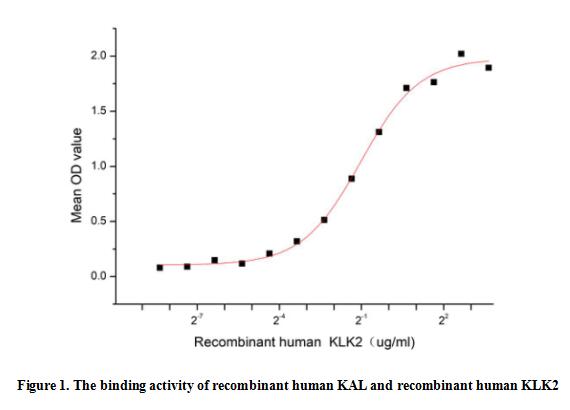Active Kallistatin (KAL)
SERPINA4; KLST; KST; PI4; Serpin Peptidase Inhibitor Clade A Member 4; Tissue Kallikrein Inhibitor; Kallikrein Binding Protein; Peptidase inhibitor 4
- Product No.UAPD392Hu01
- Organism SpeciesHomo sapiens (Human) Same name, Different species.
- Buffer FormulationPBS, pH7.4, containing 0.01% SKL, 5% Trehalose.
- TraitsFreeze-dried powder
- Purity> 80%
- Isoelectric Point8.1
- ApplicationsCell culture; Activity Assays.
- Download Instruction Manual
- UOM 10µg50µg 200µg 1mg 5mg
-
FOB
US$ 110
For more details, please contact local distributors!US$ 275
For more details, please contact local distributors! US$ 550
For more details, please contact local distributors! US$ 1650
For more details, please contact local distributors! US$ 4125
For more details, please contact local distributors!
ACTIVITY TEST of the Active Kallistatin (KAL)

Kallistatin (KAL), a member of serpin family, can Inhibit human amidolytic and kininogenase activities of tissue kallikrein. KAL is widely distributed in a variety of organs and body fluids and has biological effects such as anti-inflammatory, antioxidant stress, anti-angiogenesis and anti-tumor. Besides, Kallikrein 2 (KLK2) has been identified as an interactor of KAL, thus a functional binding ELISA assay was conducted to detect the interaction of recombinant human KAL and recombinant human KLK2. Briefly, KLK2 was diluted serially in PBS with 0.01% BSA (pH 7.4). Duplicate samples of 100 μl were then transferred to KAL-coated microtiter wells and incubated for 1h at 37℃. Wells were washed with PBST and incubated for 1h with anti-KLK2 pAb, then aspirated and washed 3 times. After incubation with HRP labelled secondary antibody for 1h at 37℃, wells were aspirated and washed 5 times. With the addition of substrate solution, wells were incubated 15-25 minutes at 37℃. Finally, add 50 µL stop solution to the wells and read at 450/630 nm immediately. When recombinant human KAL is immobilized at 2 ug/mL (100 uL/well), the concentration of KLK2 that produces 50% optimal binding response is found to be approximately 0.49 ug/mL.
USAGE of the Active Kallistatin (KAL)
Reconstitute in 10mM PBS (pH7.4) to a concentration of 0.1-1.0 mg/mL. Do not vortex.
STORAGE of the Active Kallistatin (KAL)
Avoid repeated freeze/thaw cycles. Store at 2-8°C for one month. Aliquot and store at -80°C for 12 months.
STABILITY of the Active Kallistatin (KAL)
The thermal stability is described by the loss rate. The loss rate was determined by accelerated thermal degradation test, that is, incubate the protein at 37°C for 48h, and no obvious degradation and precipitation were observed. The loss rate is less than 5% within the expiration date under appropriate storage condition.
INCREMENT SERVICES
BCA Protein Quantification Kit
Molecular Mass Marker for Protein
Monoclonal Antibody Customized Service
Polyclonal Antibody Customized Service
Protein Activity Test Experiment Service
Electrophoretic Mobility Shift Assay (EMSA) Experiment Service
Buffer
Lentivirus Packaging Experiment Service
Adenovirus Packaging Experiment Service
Real Time PCR Experimental Service
Spike RBD Protein (S-RBD)
Protein G
Protein A
Related products
| Catalog No. | Organism species: Homo sapiens (Human) | Applications (RESEARCH USE ONLY!) |
| UAPD392Hu01 | Active Kallistatin (KAL) | Cell culture; Activity Assays. |
| URPD392Hu01 | Recombinant Kallistatin (KAL) | Positive Control; Immunogen; SDS-PAGE; WB. |
| UEPD392Hu61 | Eukaryotic Kallistatin (KAL) | Positive Control; Immunogen; SDS-PAGE; WB. |
| UEPD392Hu62 | Eukaryotic Kallistatin (KAL) | Positive Control; Immunogen; SDS-PAGE; WB. |
| UPAD392Hu01 | Polyclonal Antibody to Kallistatin (KAL) | WB; IHC; ICC; IP. |
| UMAD392Hu21 | Monoclonal Antibody to Kallistatin (KAL) | WB; IHC; ICC; IP. |
| USED392Hu | ELISA Kit for Kallistatin (KAL) | Enzyme-linked immunosorbent assay for Antigen Detection. |
| ULMD392Hu | Multiplex Assay Kit for Kallistatin (KAL) ,etc. by FLIA (Flow Luminescence Immunoassay) | FLIA Kit for Antigen Detection. |



